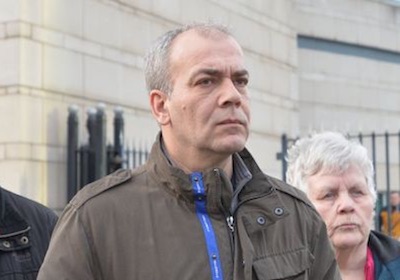
Lurgan republican Colin Duffy, a prominent victim of state injustice in the North, was released on bail on Thursday after a period of internment lasting two years and three months. Two other senior republicans, Alex McCrory and Harry Fitzsimons, were also freed last Thursday and Saturday respectively.
Their time spent behind bars is the equivalent of a four-and-a-half year sentence.
The three were among the longest-serving internees since the end of the conflict. They continue to face IRA charges, including that of holding a “leadership command” discussion about the IRA, but have been released on bail. They are required to wear electronic tags, observe a 7pm to 8am curfew and surrender all travel documents. They were also told they cannot leave the Six Counties, must report to the PSNI daily and have no contact with “witnesses”.
Mandy Duffy from the Irish Republican Prisoners’ Welfare Association said: “This was a clear example of internment by remand. They have been 800 days away from their families. It is a disgrace and a lack of due process.”
The men’s lawyer Peter Corrigan welcomed the bail decision. “If it was in England they would have been released 10 times under the custody time limits,” he said.
Mr Duffy and his family have endured an infamous litany of abuses at the hands of the British justice system in the north of Ireland. He himself has endured serial false arrests and miscarriages of justice. In January 2014, he was released after being subjected to a period of almost three years behind bars without trial. He was ultimately found innocent of the charges presented. His co-accused at that time, Brian Shivers, was convicted in a verdict which was later declared a miscarriage of justice.
Three family members of his -- Paul Duffy, Shane Duffy and Damien Duffy, known as the Duffy 3 -- were also interned for a lengthy period and endured draconian bail conditions before their case ultimately collapsed in court after three and a half years.
In an internet post Mandy Duffy, who is married to Paul Duffy, said she had become conditioned to the persecution that goes with being a republican.
“It is time for an overhaul of the PPS, they need challenged on the length of remand and the strength of evidence that keeps republicans away for long periods from their families,” she said.
NEW HOPE FOR CRAIGAVON 2
In a separate development, an important legal ruling in Britain could have a significant impact on past and future cases in the north of Ireland.
Those found guilty under ‘joint enterprise’ rules may now launch a new appeal to have their convictions overturned after England’s highest court ruled that the law had been wrongly interpreted for 30 years.
The supreme court declared on Thursday that a key test imposed by judges in assessing guilt in such cases had been incorrectly applied. The ruling means there is a possibility for the campaign for the release of the Craigavon Two, a notorious miscarriage of justice in the North, to launch a new appeal.
Brendan McConville and John-Paul Wootton were handed lengthy sentences in 2009 after being convicted under joint enterprise laws of involvement in a Continuity IRA attack against a PSNI patrol. Prosecutors were never been able to attribute a direct role to either man, who have long denied any involvement in the fatal attack.
However, the ruling could also preclude future prosecutions against members of the British Crown forces in those cases where they “could have prevented” deadly attacks. The supreme court said jurors should view foresight of an attack only as evidence to be taken into account, not as proof of guilt.
![[Irish Republican News]](https://republican-news.org/graphics/title_gifs/rn.gif)
![[Irish Republican News]](https://republican-news.org/graphics/title_gifs/harp.gif)

